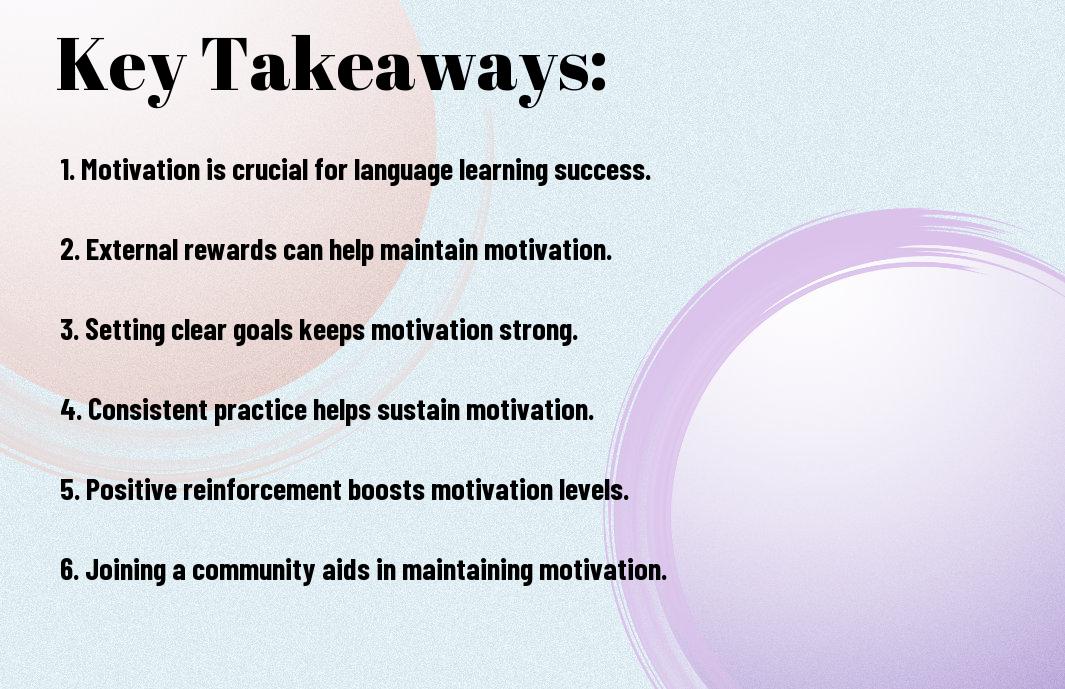There’s a crucial element that sets successful language learners apart: motivation. Your desire and determination to learn a language can greatly influence your progress and success. In this blog post, we will explore the role motivation plays in language learning and provide you with strategies on how to keep your motivation high over time.
Key Takeaways:
- Motivation is crucial: Motivation plays a crucial role in language learning as it drives individuals to persist, practice, and engage with the language. Without motivation, learners may struggle to stay committed to their language learning goals.
- Internal and external factors: Motivation in language learning can be influenced by both internal factors (personal interest, goals, self-efficacy) and external factors (teacher support, social environment, rewards).
- Maintaining motivation: To maintain motivation over time, learners can set achievable goals, vary their learning methods, find enjoyment in the language, immerse themselves in the culture, and seek support from others in the learning community.


The Power of Motivation
Defining Motivation in Language Learning
Power motivation is the driving force behind your desire to learn and master a new language. It is what fuels your persistence and determination in the face of challenges and setbacks. Motivation can come from various sources, such as a fascination with the culture associated with the language, the need to communicate with others, or simply a personal goal you’ve set for yourself.
The Impact of Motivation on Language Acquisition
Defining the impact of motivation on language acquisition is crucial to understanding how it influences your learning journey. When you are highly motivated to learn a language, you are more likely to invest time and effort in practicing and improving your skills. This dedication and enthusiasm can lead to faster and more effective language acquisition.
A high level of motivation can also help you overcome obstacles that may arise during the learning process. Whether it’s struggling with difficult grammar rules or feeling discouraged by slow progress, your motivation can act as a driving force to keep you moving forward and ultimately reach your language learning goals.

Types of Motivation
It is imperative to understand the various types of motivation that can drive your language learning journey. Different motivations can impact your learning experience and perseverance differently. Here are the main types of motivation that can influence your language learning journey:
| Intrinsic Motivation | Learning for Personal Growth |
| Extrinsic Motivation | Learning for External Rewards |
| Social Motivation | Learning with Others |
Intrinsic Motivation: Learning for Personal Growth
Growth is a powerful driver for language learning. When you are intrinsically motivated, you are driven by the personal satisfaction and joy that comes from mastering a new language. This type of motivation often leads to a deep sense of fulfillment and accomplishment as you progress in your language skills. It is fueled by your genuine interest in the language itself, rather than external rewards or pressures.
Any setbacks or challenges you face along the way are seen as opportunities for learning and growth, further fueling your motivation to continue on your language learning journey.
Extrinsic Motivation: Learning for External Rewards
Any external rewards such as grades, certificates, or job opportunities can serve as powerful motivators for language learning. When you are extrinsically motivated, you may be driven by the tangible benefits that come from mastering a new language, such as career advancement or social recognition. While external rewards can provide initial motivation, they may not always sustain your interest in the long run.
To maintain your motivation when driven by external rewards, it is imperative to set clear goals and milestones for yourself. Celebrate your achievements along the way to stay motivated and focused on your language learning objectives.
Social Motivation: Learning with Others
Extrinsic motivation can also come from social interactions and the desire to connect with others through language. When you are socially motivated, you may be driven by the opportunities to communicate with people from different cultures and backgrounds. Learning a language to connect with others can enhance your overall learning experience and make the process more enjoyable and meaningful.
External factors such as group study sessions, language exchange programs, or collaborative projects can further boost your motivation and help you stay engaged in your language learning journey.
The Role of Goals in Motivation
Despite your initial enthusiasm for learning a new language, it can be easy to lose motivation over time. Setting goals is crucial in maintaining your motivation and keeping you on track with your language learning journey.
Setting Realistic Goals
With language learning, it’s crucial to set realistic goals that are achievable within a specific timeframe. Setting goals that are too ambitious can lead to frustration and demotivation if they are not met. By setting realistic goals, you can see your progress more clearly and stay motivated to continue learning.
Breaking Down Big Goals into Smaller Ones
Any large goal can seem overwhelming at first glance. Breaking it down into smaller, more manageable tasks can make it feel less daunting and more achievable. For example, if your goal is to become fluent in a new language, you can break it down into smaller goals such as learning a certain number of new words each week or practicing conversation for a specific amount of time each day.
By breaking down big goals into smaller ones, you can track your progress more effectively and celebrate small victories along the way. This can help maintain your motivation and keep you engaged in your language learning journey.
Celebrating Achievements
Motivation can be boosted by celebrating your achievements, no matter how small they may seem. Whether it’s successfully holding a conversation with a native speaker or mastering a difficult grammar concept, taking the time to acknowledge and celebrate your progress can help keep you motivated to continue learning.
Motivation can be strengthened by recognizing and rewarding yourself for the effort you put into your language learning. By celebrating your achievements, you can stay focused on your goals and remain enthusiastic about your progress.
Overcoming Obstacles to Motivation
After exploring the significance of motivation in language learning, as discussed in “The Role of Motivation in Second Language Acquisition” research article, it’s vital to address the challenges that may hinder your progress and dampen your enthusiasm.
Dealing with Frustration and Discouragement
For many language learners, frustration and discouragement are common hurdles on the path to proficiency. You may find yourself struggling with complex grammar rules, feeling overwhelmed by unfamiliar vocabulary, or experiencing setbacks in your linguistic journey. During these times, it’s crucial to remind yourself of how far you’ve come and celebrate the small victories along the way. Reflect on past achievements, whether it’s mastering a tricky pronunciation or successfully holding a conversation in your target language. By acknowledging your progress, you can boost your confidence and reignite your motivation to keep pushing forward.
Managing Procrastination and Distractions
On your language learning journey, you may encounter the temptation to procrastinate or get sidetracked by distractions. Whether it’s the allure of social media, the comfort of your favorite TV show, or simply feeling overwhelmed by the task ahead, avoiding procrastination is key to staying motivated. To combat this, try breaking down your study sessions into manageable chunks and setting specific goals for each session. Additionally, create a dedicated study space free from distractions to help you stay focused and on track. Do not forget, consistency is key when it comes to language learning, so finding ways to manage procrastination will ultimately propel you towards your goals.
This subsection researchs into strategies for overcoming procrastination and distractions, offering practical tips to help you stay on course with your language learning endeavors. It provides actionable advice on creating a conducive study environment and setting achievable goals to maintain your motivation and productivity levels. By implementing these strategies, you can effectively address common obstacles that may hinder your language learning progress and boost your overall success.
Finding Inspiration in Language Learning
With the vast array of resources and opportunities available for language learners, finding inspiration can be a powerful tool to fuel your motivation. Whether it’s connecting with native speakers, immersing yourself in authentic cultural experiences, or setting meaningful goals for your language proficiency, drawing inspiration from various sources can make your learning journey more engaging and fulfilling. Do not forget, learning a language is not just about mastering vocabulary and grammar but about exploring new horizons and broadening your perspectives. Seek out what excites and motivates you in your language learning process, and let that passion drive you towards fluency.
Strategies for Maintaining Motivation
Creating a Language Learning Routine
One effective strategy for maintaining motivation in your language learning journey is to create a routine. By setting aside dedicated time each day to practice, study, and engage with the language, you can establish a sense of discipline and consistency that will keep you motivated in the long run. Whether it’s starting your day with vocabulary drills, listening to podcasts during your commute, or joining a language exchange group in the evenings, having a structured routine will help you stay on track and make continuous progress.
Finding a Language Learning Buddy or Community
Finding a language learning buddy or community can be a game-changer in your motivation levels. Connecting with others who are also on the language learning journey can provide you with support, accountability, and a sense of camaraderie. Whether it’s practicing conversational skills with a language partner, participating in group study sessions, or joining online forums and social media groups dedicated to language learning, interacting with like-minded individuals can keep you inspired and motivated to continue pushing forward.
Having a language learning buddy or being part of a community allows you to share your challenges and successes, seek advice and tips, and celebrate progress together. It creates a social aspect to language learning, making the process more engaging and enjoyable. Additionally, seeing others achieve their language goals can serve as a source of inspiration and motivation for you to keep going.
Rewarding Progress and Milestones
An effective way to maintain motivation in your language learning journey is to reward yourself for reaching milestones and making progress. Celebrating small victories, such as mastering a difficult grammar concept, having a successful conversation in the target language, or completing a language learning challenge, can boost your confidence and keep you motivated to continue learning. Consider treating yourself to something you enjoy, whether it’s a movie night in your target language, a special meal from a country where the language is spoken, or a small gift to yourself as a token of your hard work and dedication.
By acknowledging and celebrating your achievements along the way, you reinforce positive behaviors and create a sense of accomplishment that will fuel your motivation to keep striving towards your language learning goals. Keep in mind, progress is not always linear, and it’s important to recognize and appreciate the effort you’re putting in, no matter how small the steps may seem.
The Importance of Feedback and Self-Assessment
Unlike other aspects of language learning, such as vocabulary memorization or grammar drills, feedback and self-assessment are crucial for your progress. These tools help you track your development and pinpoint areas where you need to improve. By receiving feedback and assessing your own performance, you can stay motivated and focused on your language learning journey.
Tracking Progress and Identifying Areas for Improvement
On your language learning path, it’s vital to regularly assess your progress. Keep a language journal where you can note down new vocabulary learned, sentences constructed, or conversations held. By reviewing your journal regularly, you can identify patterns of improvement or stagnation. This self-assessment will guide you in setting new goals and adjusting your study strategies for better results.
Seeking Feedback from Teachers, Peers, or Mentors
Tracking your progress is vital, but receiving external feedback is equally important. Whether from language teachers, peers in language exchange programs, or mentors, external feedback provides valuable insights into your language skills. Others can notice mistakes or areas of improvement that you might overlook. By actively seeking feedback from others, you can gain a more comprehensive understanding of your language abilities and receive guidance on how to enhance them further.
From language teachers, you can get targeted feedback on grammar usage and pronunciation. Peers can help you practice conversation skills and provide cultural context to enrich your learning experience. Mentors, who may be advanced language learners or native speakers, can offer guidance on nuanced language usage and expressions.
Adjusting Goals and Strategies Based on Feedback
Based on the feedback you receive, it’s crucial to adjust your goals and study strategies accordingly. If multiple sources of feedback point out a recurring mistake, you can prioritize addressing that issue in your practice sessions. Additionally, if feedback highlights a particular aspect of the language where you excel, you can tailor your goals to leverage that strength in your learning process.
Strategies such as setting short-term achievable goals, integrating feedback into your study routine, and regularly reassessing your progress can help you maintain motivation and momentum in your language learning journey. Be mindful of, feedback is not just about pointing out mistakes; it’s a tool for growth and improvement that can propel you towards language fluency.
To wrap up
Drawing together all the pieces, you’ve learned that motivation is a crucial element in language learning. It serves as the driving force that keeps you focused and determined to achieve your language learning goals. Motivation can be nurtured through setting realistic goals, finding enjoyment in the learning process, and seeking out opportunities to practice and use the language in meaningful ways.
To maintain motivation over time, remember to celebrate your progress, seek out new challenges, and adapt your approach to keep things fresh and engaging. By staying motivated and committed to your language learning journey, you can overcome any obstacles that come your way and achieve fluency in the language of your choice.
Q: What role does motivation play in language learning?
A: Motivation is important in language learning as it fuels the desire to improve communication skills, overcome challenges, and achieve fluency. It helps learners stay engaged, persistent, and dedicated to their language learning goals.
Q: How can motivation be maintained over time in language learning?
A: To maintain motivation over time, language learners can set realistic and achievable goals, celebrate small victories, track progress, seek support from peers or language learning communities, vary study routines, and remind themselves of the benefits and rewards of bilingualism.
Q: What are some strategies to boost motivation in language learning?
A: Some strategies to boost motivation include exposing oneself to authentic language materials, setting specific goals with timeframes, visualizing success, finding a language learning buddy, incorporating fun activities into language practice, and taking breaks when feeling overwhelmed or frustrated.


